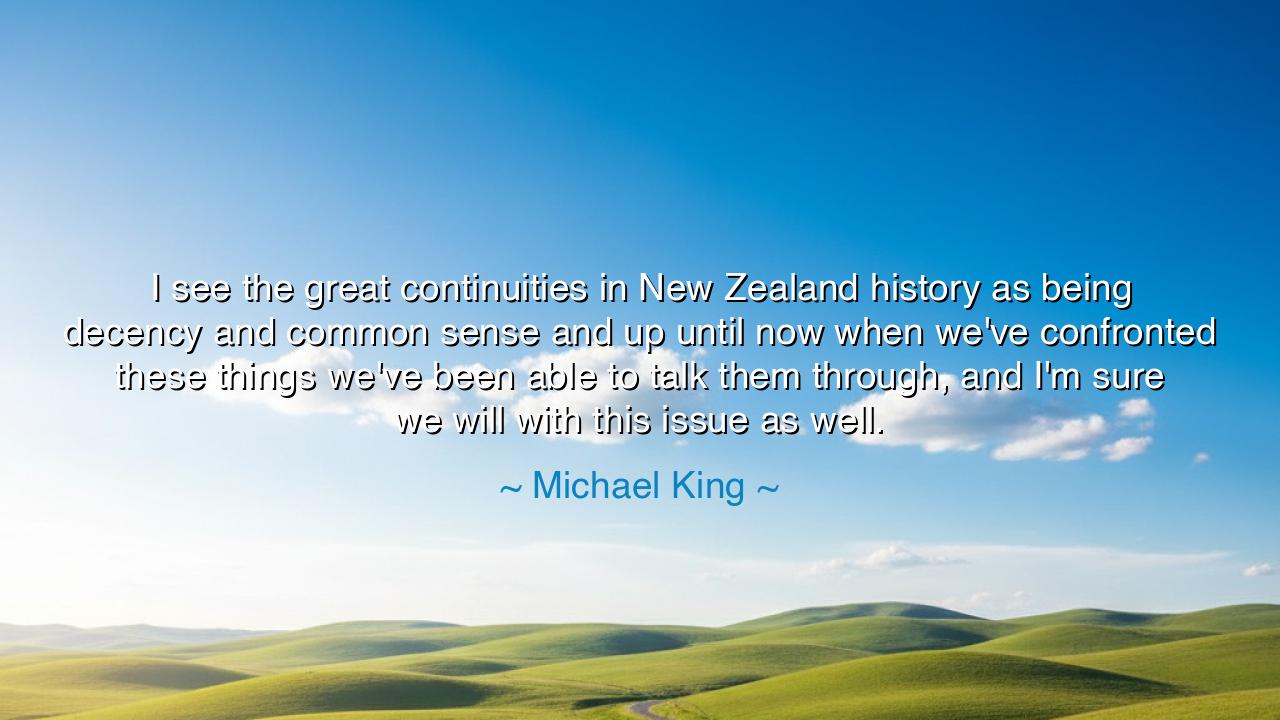
I see the great continuities in New Zealand history as being
I see the great continuities in New Zealand history as being decency and common sense and up until now when we've confronted these things we've been able to talk them through, and I'm sure we will with this issue as well.





When Michael King, the revered historian and storyteller of Aotearoa, spoke the words, “I see the great continuities in New Zealand history as being decency and common sense and up until now when we've confronted these things we've been able to talk them through, and I'm sure we will with this issue as well,” he spoke not as a politician or prophet, but as a keeper of memory — one who had studied the heart of a nation and found its rhythm steady and good. His words carry the quiet strength of a people who have walked the long road from hardship to harmony, and who understand that the truest power of a civilization lies not in conquest, but in its decency, its common sense, and its capacity for dialogue.
The origin of this quote lies in King’s reflections on New Zealand’s evolving social and cultural identity — particularly the relationship between Māori and Pākehā, the indigenous and the settler peoples of the land. As one of New Zealand’s most beloved historians, King devoted his life to telling the story of both, weaving them together into a single tapestry of humanity, rather than a tale of division. His belief was simple yet profound: that history, when viewed honestly, reveals not only struggle and injustice but also endurance, reconciliation, and the quiet moral fabric that binds a nation. In these words, he offers both an observation and a hope — that the spirit of decency and common sense which guided his country through past storms will continue to steady it in the face of new trials.
To say that decency and common sense are the great continuities of a people is to say that moral integrity and practical wisdom are more enduring than politics or power. For these virtues belong not to any government, but to the soul of ordinary citizens — to those who work the land, raise their families, and treat their neighbors with respect. King saw in New Zealand’s past a pattern of compassion that transcended division. Where other nations descended into bitterness, New Zealanders often chose to talk things through, to face their differences not with violence, but with conversation and compromise. This, he believed, was the mark of a mature civilization — one that understands that listening is stronger than shouting, and humility braver than pride.
A powerful example of this truth can be found in the Treaty of Waitangi, signed in 1840 — an imperfect yet monumental attempt to build a shared future between two peoples. Though the treaty’s promises were broken and its meanings disputed, its spirit endured. Generations later, as Māori voices rose again to claim justice, the nation did not collapse into chaos, but chose dialogue. Through the Waitangi Tribunal and years of careful conversation, wrongs were acknowledged, reparations made, and understanding deepened. It was not an easy process, nor a flawless one, but it embodied exactly what King described — the decency and common sense of a people willing to confront their past honestly and to move forward together.
King’s words were spoken not only for his own time but for all who would follow. He knew that every era brings its “issues” — moral tests that challenge the conscience of society. Whether it be matters of race, the environment, or inequality, his faith remained unshaken: that the same virtues which guided New Zealand through its earlier trials would guide it again. His belief in the nation’s ability to talk things through was not naïve optimism, but historical wisdom. He had seen that the strength of a people lies not in avoiding conflict, but in their ability to face it without hatred.
There is a deep humility in his insight — a recognition that history’s progress depends on the everyday morality of citizens. For what is a nation, if not the sum of its people’s choices? When individuals act with decency, societies grow kinder; when they use common sense, they find balance between change and tradition. In this way, King reminds us that history is not shaped only by leaders and wars, but by the moral temper of those who live within it. The greatest revolutions, he suggests, are those of character — the quiet revolutions that happen in how a people listen, speak, and forgive.
So, O reader of time, take this teaching into your heart: when division rises, when tempers flare and uncertainty clouds your nation’s future, remember the virtues that endure — decency and common sense. Speak, but also listen. Disagree, but never dehumanize. Seek truth, not victory. For as Michael King believed, the strength of a people is measured not by how loudly they shout in anger, but by how patiently they speak in understanding.
Let us then be faithful inheritors of his vision — guardians of conversation, keepers of kindness, and builders of bridges between hearts. For history is not made only in great deeds, but in small acts of respect and reason, passed from one generation to the next. And if we preserve these things — this decency, this common sense — then indeed, as King foretold, we shall always find our way through whatever trials come, talking them through beneath the southern stars, as one people bound by the enduring wisdom of the human heart.






AAdministratorAdministrator
Welcome, honored guests. Please leave a comment, we will respond soon